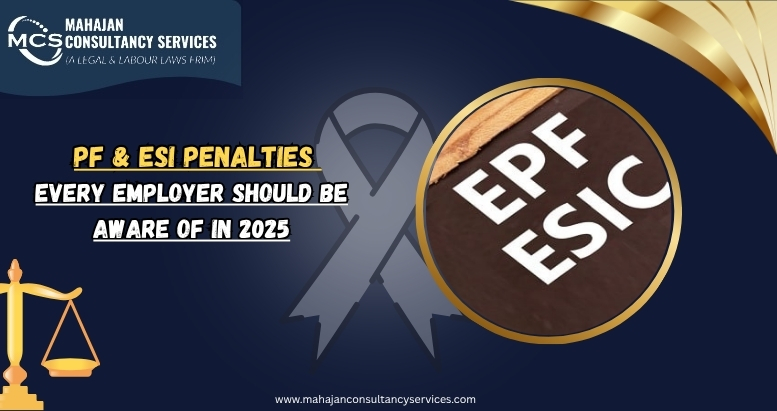In 2025, employers in India need to stay vigilant regarding compliance with Provident Fund (PF) and Employees’ State Insurance (ESI) regulations. Both PF and ESI are mandatory social security schemes under Indian law designed to protect employees. Employers who fail to comply with statutory requirements face serious penalties including fines, interest charges, and even legal prosecution. Many small and medium enterprises underestimate the risks of non-compliance, but recent updates and strict enforcement make it imperative for all employers to remain compliant.
Understanding the penalties and compliance requirements is crucial not only to avoid financial loss but also to maintain employee trust and safeguard the company’s reputation. Mahajan Consultancy, a trusted corporate legal services provider in India, advises that proactive compliance and professional management of PF and ESI obligations is the best strategy to reduce business risks.
Provident Fund (PF) Penalties
1. Interest on Delayed Contributions
Employers are required to deposit both their share and the employee’s share of PF contributions to the Employees’ Provident Fund Organisation (EPFO) by the 15th of the following month. Delayed contributions attract interest charges of 12% per annum. In addition, penal damages may be levied at 1% per month on the outstanding amount, capped at 12% annually.
The rationale behind this strict interest mechanism is to ensure timely deposits. For example, if an employer delays PF payment for three months for 50 employees earning an average salary of ₹20,000 per month, the interest and penalties could accumulate to a significant financial burden. This can directly impact a company’s cash flow and credibility with employees.
2. Escalating Penal Damages
The EPFO imposes escalating penalties for continued non-compliance:
- Delay up to 2 months: 5% per annum.
- Delay between 2 to 4 months: 10% per annum.
- Delay between 4 to 6 months: 15% per annum.
- Delay exceeding 6 months: 25% per annum.
These escalating penalties are intended to encourage employers to remit contributions promptly. Companies that ignore PF obligations for extended periods may find themselves liable for substantial compounded penalties.
3. Legal Consequences for Non-Deposit
Non-deposit of the employee’s share is treated as a criminal breach of trust under the Indian Penal Code. The consequences are severe:
- Imprisonment for up to 2 years.
- Fine of up to ₹5,000.
This is particularly relevant for small or medium enterprises where delayed payments are sometimes treated as administrative oversights. The law considers this negligence serious, highlighting the importance of timely compliance.
4. Vishwas Scheme 2025
To encourage compliance, EPFO launched the Vishwas Scheme 2025, allowing employers to regularize past defaults with a nominal penal damage of ₹100. The scheme covers defaults between July 1, 2017, and October 31, 2025. The scheme is particularly beneficial for businesses that have previously faced challenges in PF contribution management, offering them a chance to clear past dues with minimal financial impact.
Employers should consult professionals to ensure eligibility and avoid mistakes while availing of this scheme, as incorrect application can result in disqualification.
Employees’ State Insurance (ESI) Penalties
1. Interest on Delayed Contributions
ESI contributions must be deposited by the 15th of the following month. Delays attract 12% per annum interest on the outstanding amount. For companies with multiple branches or a large workforce, even a small delay can accumulate into a substantial liability, making it critical to prioritize ESI deposits alongside PF payments.
2. Penalties for Non-Filing of Returns
Employers are required to file ESI returns every six months. Failure to file returns on time can lead to:
- Monetary fines imposed by ESIC authorities.
- Legal action, including court summons and potential prosecution.
Non-filing may also trigger inspections by ESIC officials, which can disrupt operations and lead to further penalties if discrepancies are discovered during audits.
3. SPREE Scheme 2025
The SPREE Scheme 2025 is a compliance incentive designed to encourage registration of unregistered employers. The scheme provides legal immunity, waiving inspections and demands for backdated dues for unregistered companies. Registration through the ESIC portal is required, and the scheme ensures that businesses operating without registration can become compliant without facing historical penalties.
This is particularly helpful for small businesses or startups that may not have been aware of ESI obligations at the time of hiring employees. SPREE provides a clean slate for such companies, making compliance manageable without excessive financial strain.
4. Amnesty Scheme 2025
The ESIC has also launched an Amnesty Scheme 2025, which allows employers to regularize past defaults without the high penalties and interest that would otherwise apply. This one-time opportunity applies to defaults before a specific cut-off date and encourages employers to come forward voluntarily to bring their companies into compliance. Businesses should take professional advice to ensure accurate reporting and avoid inadvertent penalties under this scheme.
Practical Steps for Employers to Avoid Penalties
- Implement Automated Payroll Systems: Automating PF and ESI calculations reduces errors, ensures timely deposits, and generates compliance reports.
- Set Reminders for Monthly Contributions: Maintain a calendar or automated alert system to track PF and ESI deadlines.
- Conduct Regular Audits: Periodic internal audits of PF and ESI contributions help detect discrepancies before authorities raise penalties.
- Consult Legal Experts: Engaging professional services, such as Mahajan Consultancy, ensures that companies remain compliant with changing laws, particularly for large or multi-state operations.
- Educate HR and Finance Teams: Proper training on statutory requirements ensures that responsibility for compliance is clearly understood and implemented.
- Keep Documentation Ready: Accurate records of employee contributions and remittances help in case of inspections or disputes.
The Importance of Compliance Beyond Penalties
PF and ESI compliance is not just about avoiding penalties. Proper compliance:
- Protects employees’ rights and builds trust.
- Enhances company credibility among clients, partners, and investors.
- Reduces litigation risk by ensuring that employee entitlements are clearly met.
- Promotes long-term financial planning for businesses by avoiding sudden liability spikes.
Non-compliance may damage employee morale and lead to disputes, which can escalate into costly legal battles. Businesses that proactively comply with PF and ESI laws demonstrate responsible corporate governance.
Why Mahajan Consultancy
Mahajan Consultancy provides expert advisory and compliance services for PF and ESI regulations. Their services include:
- Regular monitoring of PF and ESI contributions.
- Assistance in timely filing of returns.
- Guidance for availing Vishwas, SPREE, and Amnesty Schemes.
- Risk assessment and legal advisory to avoid penalties.
By leveraging Mahajan Consultancy’s expertise, businesses can focus on growth while ensuring statutory obligations are met efficiently and accurately.
Conclusion
In 2025, PF and ESI compliance has become more critical than ever for Indian employers. Ignoring statutory obligations can lead to interest charges, penal damages, legal prosecution, and disruption of business operations. Employers must prioritize timely deposits, accurate filings, and proactive engagement with compliance experts.
Schemes like Vishwas and SPREE offer relief for past defaults, but the best strategy is always proactive compliance. By working with professional consultants such as Mahajan Consultancy, employers can protect their business, safeguard employees’ interests, and maintain corporate credibility in an increasingly regulated environment.
FAQs
- What is the deadline for PF and ESI contributions?
Both PF and ESI contributions must be deposited by the 15th of the following month. - What are the penalties for late PF contributions?
Penalties include 12% annual interest and escalating penal damages up to 25% per annum depending on delay duration. - Can employers avail of the Vishwas Scheme for PF?
Yes, the Vishwas Scheme allows employers to regularize past PF defaults by paying a nominal penal damage of ₹100. - What are the consequences of non-filing ESI returns?
Non-filing can result in fines, legal action, and additional inspections by ESIC authorities. - How can employers register under the SPREE Scheme?
Employers can register digitally via the ESIC portal to gain legal immunity for past defaults. - Are there exemptions for small businesses?
Yes, exemptions apply based on employee count and wage thresholds. Employers should consult ESIC and EPFO guidelines for details. - How can employers ensure timely compliance?
Automated payroll systems, internal audits, and reminders help maintain compliance. - What should employers do if they miss a contribution deadline?
They should remit the pending contribution immediately and seek guidance to rectify defaults. - Can penalties be waived under any scheme?
Schemes like Vishwas and SPREE allow partial or nominal waiver of penalties for past defaults. - Why consult Mahajan Consultancy for PF and ESI compliance?
Their expertise ensures timely compliance, mitigates legal risks, and provides guidance on leveraging statutory relief schemes effectively.




